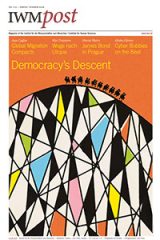

In collaboration with
Institute for Human Sciences
The Institute for Human Sciences / Institut für die Wissenschaften vom Menschen (IWM) is an independent institute for advanced study in the humanities and social sciences. Since its foundation in 1982, it has hosted more than 1500 scholars, journalists and translators from all over the world. Many of the Institute’s Permanent and Visiting Fellows are regular contributors to Eurozine or its focal points The World in Pieces and Ukraine in European Dialogue (see below).
Website: www.iwm.at
Twitter: @IWM_Vienna
Youtube: IWMVienna

Articles
Krysztof Pomian examines European attitudes towards Poland and Poland’s attitudes towards the European Union. He uncovers startling similarities in the rhetoric used by the European Left and the Polish Right in their arguments against the enlargement.
Poland as the sick man of Europe?
Jedwabne, "post-memory" and historians
Joanna Tokarska-Bakir investigates the defence mechanisms triggered by the European past: on the one hand the Holocaust guilt-complex and on the other the language historians use to talk about it.
Right Wing Populism as class struggle
France after April 21st
Jacqueline Henard analyses the failings of the French political elite which have paved the way for Le Pen’s shock rise in the last presidential elections.
Between democratic fatigue and the politics of fear
The French presidential elections 2002
This was no regular presidential election, it was a referendum on basic commitment to democratic values and an open society. Jacques Rupnik takes a look at French politics and discovers a radical shift.
Focal points

Inspired by a lecture that Clifford Geertz delivered in 1995 at the Institute for Human Sciences in Vienna, this focal point engages with ‘deep diversity’, ‘a sense of dispersion, of particularity, of complexity and of uncenteredness’ rather than unified world order. It follows the launch of a research programme of the same name at the institute in January 2023.

Post-revolutionary Ukrainian society displays a unique mix of hope, enthusiasm, social creativity, collective trauma of war, radicalism and disillusionment. With the Maidan becoming history, the focal point ‘Ukraine in European Dialogue’ explores the new challenges facing the young democracy, its place in Europe, and the lessons it might offer for the future of the European project.
Projects and publications

